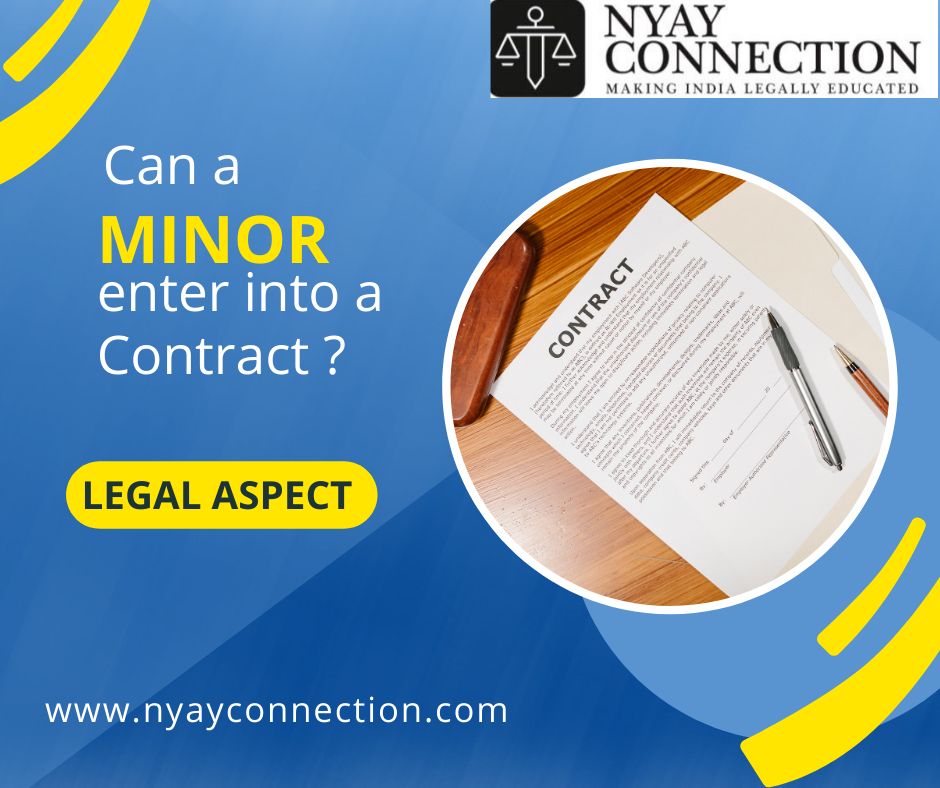Introduction
The legal validity of the agreement entered into by a Minor has been discussed in this article. For a valid contract essential conditions are given in Sec. 10 of the Indian Contract Act, 1872 which are as under :
1. There must be an agreement.
2. Agreement must be made with the free consent of the parties.
3. Parties must be competent to make a contract.
4. Agreement was for a lawful consideration and with a lawful object.
5. Agreement is not expressly declared as void by Law.
Persons who are competent to contract- (Sec. 11)
1. A person who is a Major according to law to which he is subject;
2. Who is of sound mind, and
3. Who is not disqualified by any law from contracting.
If all the conditions are satisfied then the person is competent to enter into an contract. So, a person who has not attained the age of majority is a minor for the purposes of this section. Hence, as per sec. 11, a minor is not competent to enter into any contract on his own behalf, yet, sometimes minor may took loans , or made some bargains, or be supplied with some goods by third parties, in this context we are discussing the position of a minor.
Position of a Minor
As per sec. 3 of the Indian majority act, 1875 ‘a person is Major if he has attained the age of 18 years, except when a Guardian has been appointed by the court for a person, then the age of majority is 21 years’.

A minor is incompetent to make a contract, so, what will be the nature of minor’s agreements, are they void or voidable?.
Contract Act does not have any provision which specifically declares the minor’s agreements as void or voidable. So, this lacuna has been filled by the Judiciary by making the authoritative pronouncements on this topic. One of such is “Mohiri Bibi Vs. Dharmodas Ghose” – (1903) I. A. 114 Privy Council – in which it was held that –
1. Minor’s Agreement is void ab initio (void from the beginning).
2. A Minor can not be compelled to repay the loan which he has taken from the other side by misrepresenting his age.
3. Even a minor is not bound to restore the advantage which he has received under the void agreement by taking recourse to sec. 65 of the contract Act, As sec. 65 becomes applicable where the agreement is discovered to be void or where a contract becomes void. But in the case of a minor, the agreement is not discovered to be void rather it is void ab initio i.e. void from the inception/ beginning. So, he can not be aked to repay the amount even as per sec. 65.
4. In the present case even the minor can not be asked to make any compensation to the other party as per sec. 41, Specific Relief Act, 1877 ( now Replaced with Specific Relief Act 1963, sec 33 of the present Act), because the fact of misrepresentation by minor is already known to the defendant.
Hence, it may be concluded that “Minority is a Boon” and he can’t be asked to repay the loan taken by him as Minor’s Agreements are void.
Some other principles regarding the Minor’s agreements are as under :
1. As Minor’s Agreements are void ab Initio, So, Law of Estoppel will not apply against the minor. He is allowed to plead minority as a defence to avoid liability under an agreement even in the case where he misrepresented about his age.
2. There is a doctrine of Restitution in England, which says that if a Minor has obtained undue advantage in any transaction, he is required to restore the the benefit so received if it can be traced out. But this principle is not strictly applicable in India.
But, the position in India has been changed by the Lahore High court in the famous case of ‘Khan Gul Vs. Lakha Singh’ in the year 1928 in which it was held that “Asking a minor to return the undue advantage which he has received, is not the enforcement of the void agreement rather it is the restoration of both the parties to their original position. Section 33,specific relief act, 1963 deals with this.
Minor’s Liabilities for necessaries (Sec. 68)
Minor’s agreements are void ab initio yet reimbursement is permitted to the person supplying such necessaries. But the Minor is not personally liable only his property is liable (if any). Necessaries means things and services without which a person cannot reasonably exist. Necessaries may depend upon the status of a person and also his requirements at the time of actual delivery of goods. The goods supplied should be suited to the minor’s condition in life.
Minor’s contract of service
In India, Minor’s contract of service is void and no liability can be imposed upon a minor but he may accept the benefits whereas in England Minor’ contract of service are valid.
Position of Minor in Partnership
For a valid partnership, there must be a contract. As a minor is not competent to make a contract so he can’t become a full fledged partner with other major partners. But with the consent of all the partners he may become partner for benefits only.
Position of Minor in a Contract of Agency (sec.183)
A Minor can neither become a principal nor can appoint an agent on his behalf. What he can not do himself, he can’t do that even through an agent.
But he may be appointed as an agent between the principal and the third person. (Sec. 184, Indian Contract Act)
Conclusion
We may conclude that as per Law and judicial pronouncements Minor’s Agreements are Void and Minority is no longer a Boon in the strict Sense. As per Specific Relief Act, 1963 the minor can be asked to restore the benefit which he has received in any transaction or to make the compensation as the Justice of the case requires. This is not the enforcement of the void contract but reverting back the parties to their pre contract position.
This article has been written by Advocate Ankush Gupta. Ankush is a practicing advocate in the courts of Haryana and deals in criminal and matrimonial matters.



